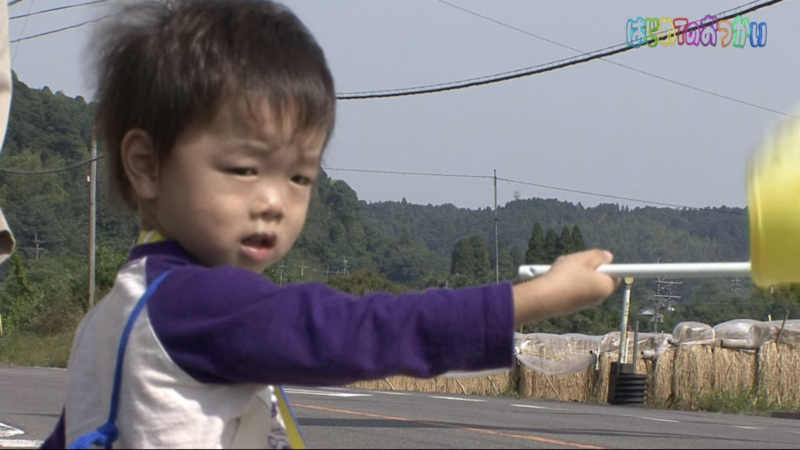All Americans Should Watch Old Enough!, a Netflix Show About Free-Range Japanese 3-Year-Olds
In Japan, even very young children are seen as capable.

Two years and nine months: That's the age of the first child we watch going on an errand by himself in the new Netflix series, Old Enough! How can someone that young possibly walk half a mile alongside a highway, cross a big street, and navigate a supermarket? Simple. He lives in Japan.
In that country, parents proudly let their kids walk to school and even ride the subway solo by first grade. Old Enough! pushes the age down further for dramatic effect, but that's what makes it so cute—and so crucial for Americans to see.
I won't make this all about me, but 14 years ago I wrote a column titled, Why I Let My 9-Year-Old Ride the Subway Alone. It got me slammed. In America, it's a scandal—and sometimes even a crime—to let your kids do anything alone before they hit double digits. But in Japan?
Well, consider Hiroki, the boy in the first Old Enough! episode. His job is to get fishcakes, curry, and some flowers for his grandmother's altar.
At first he looks a little daunted. But by golly, he gets to the grocery, finds the fishcakes, and even asks a clerk to help him find the flowers. (Can your child—perhaps in college—do that?)
Outside, he remembers, "I forgot the curry!" and goes back in to buy it.
Then he heads home, filmed by a camera crew adept at hiding in the bushes.
Contrast this with current American norms. When I was growing up, most children walked to school. Today? It's about 10 percent. An American Academy of Pediatrics white paper states that "children should not be unsupervised pedestrians before 10 years of age, except in limited situations." How come? "Normal developmental characteristics, such as magical thinking, egocentricity, distractibility, and impulsivity, increase pedestrian risk for children."
What about the normal developmental characteristics we see on Old Enough!, like tenacity, helpfulness, bravery, and purpose? In the U.S., we see children only through the lens of vulnerability. We see all the ways they could screw up or get hurt.
In Japan—or at least in Old Enough!—kids are seen as capable. And the thing is, they are.
The series has been running for 30 years in Japan, where it's called My First Errand. Its appeal is obvious: No one is as adorable or determined as a pre-schooler. And so, in one episode, a four-year-old is tasked with getting a cabbage from a farm.
Her mom has left one for her in the barn, but the girl assumes she must pull one from the patch. Cabbages grow on stalks thicker than broom handles. The girl pulls and pulls. No luck. So eventually she grabs the cabbage and starts twisting it like the steering wheel of a bus. She does this for half an hour.
What's that the AAP said about kids being easily distracted and impulsive?
At last, the cabbage breaks off its stalk. The girl drags it home as night is falling. Like all the kids in this show, she ends the day extremely happy and fulfilled. Her parents are happy, too.
This is the profound reward of parenting we deny ourselves in America. By doing everything with and for our kids, we don't let them show us how incredibly competent they can be. How can we possibly get up the courage to let our kids go out into the world before they're old enough for a beer run?
It's easier than it seems. My own reality show, World's Worst Mom, filmed about eight years ago, was a sort of dystopian twin of Old Enough! I, too, sent kids out on their first errands, but they were age nine, 10, 12, or, in one case, 16. Their extremely overprotective parents had not been able to let go until an outsider—me—prodded them. (The 16-year-old's mom packed him an Elmo juice box.)
Once they were finally let outside without a security detail, the kids, even the adolescents, were proud as peacocks. And the parents were ecstatic: Their fear evaporated, replaced by pride and joy.
But of course, there's another fear parents face in America: someone calling the cops. You may have heard of the Meitivs of Maryland, investigated twice for letting their kids, ages 10 and six, walk home from the park alone. But from where I sit—as founder of the Let Grow, the nonprofit promoting childhood independence—I hear from other parents investigated for things like letting their kids play outside, venture down the street, or even walk the dog.
The good news is that lately we've had some huge breakthroughs. Legislators across the political spectrum have passed "reasonable childhood independence" laws in four states— including Colorado, just a few weeks ago. These laws clarify that "neglect" is when you put your kid in obvious danger, not anytime you let them out of your sight.
More good news is that the surgeon general recently reached out to discuss the possible connection between kids' decreasing free time and the increasing rates of childhood anxiety and depression. Maybe more independence could boost kids' mental health?
Watching Old Enough!, the power of childhood independence sure seems worth harnessing. Those kids are thrilled to embark on the great journey of life. American kids are ready for that journey too.
